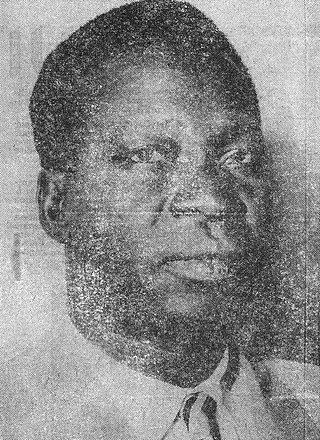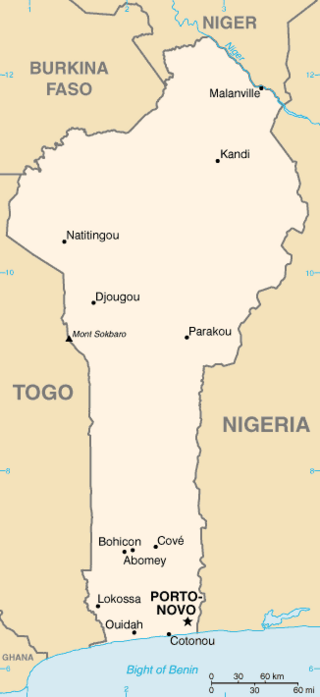
Émile Derlin Zinsou was a Beninese politician and physician who was the President of Dahomey from 17 July 1968 until 10 December 1969, supported by the military regime that took power in 1967. Zinsou was present at the signing of the treaty that formed the African Union on 12 July 2000 in Togo.

Sourou-Migan Marcellin Joseph Apithy was a Beninese political figure most active when his country was known as Dahomey. He arose on a political scene where one's power was dictated by what region in Dahomey one lived in.

Coutoucou Hubert Maga was a politician from Dahomey. Born a peasant in 1916, Maga served as a schoolmaster from 1936 to 1945, during which time he gradually gained considerable influence among the uneducated. He rose to power despite regionalist politics in Dahomey, and was elected to Dahomey's territorial assembly in 1947 and founded the Northern Ethnical Group, later renamed the Dahomey Democratic Rally. In 1951, Maga was elected to the French National Assembly, where he served in various positions, including premier from 1959 to 1960. When Dahomey gained its independence from France on August 1, 1960, Maga was appointed to the presidency, and was officially elected to that post on December 11.
The Rassemblement Démocratique Africain, commonly known as the RDA and variously translated as African Democratic Assembly and African Democratic Rally, was a political party in French West Africa and French Equatorial Africa which was important in the decolonization of the French empire. The RDA was composed of different political parties throughout the French colonies in Africa and lasted from 1946 until 1958. At certain points, the RDA was the largest political party in the colonies in Africa and played a key role in the French government headed by the Democratic and Socialist Union of the Resistance (UDSR). Although the regional party largely dissolved in 1958 with the independence votes for the colonies, many of the national parties retained the RDA in their name and some continue to do so. The political ideology of the party did not endorse outright secession of colonies from France, but it was anti-colonial and pan-Africanist in its political stances.

Elections in Benin take place within the framework of a multi-party democracy and a presidential system. Both the President and the National Assembly are directly elected by voters, with elections organised by the Autonomous National Electoral Commission (CENA).
The 1963 Dahomeyan coup d'état was staged on October 28, 1963, by Christophe Soglo, who took control of the Republic of Dahomey to prevent a civil war. He overthrew Hubert Maga, whose presidency faced extreme economic stagnation and a host of other problems.

Elections for the Territorial Assembly were held in French Dahomey on 30 March 1952. Sourou-Migan Apithy's Republican Party of Dahomey won 19 of the 32 second college seats. Only ten members of the Legislative Council elected in 1947 were re-elected.

Elections to the French National Assembly were held in French Dahomey on 10 November 1946. The territory elected a single member to the Assembly. Sourou-Migan Apithy was the only candidate, and was elected unopposed. Voter turnout was 59%.

Elections to the French National Assembly were held in French Dahomey on 17 June 1951. The territory elected two seats to the Assembly, which were won by Sourou-Migan Apithy of the List of the French Union and Hubert Maga of the Ethnic Group of the North. Voter turnout was 44%.

Elections to the French National Assembly were held in French Dahomey on 2 January 1956. The territory elected two seats to the Assembly, which were won by Sourou-Migan Apithy of the Republican Party of Dahomey and Hubert Maga of the Ethnic Group of the North. Voter turnout was 47%.

Elections to the French National Assembly were held in French Dahomey and French Togoland on 2 June 1946. The territory elected two seats to the Assembly via two electoral colleges. Pierre Bertho of the Popular Republican Movement was elected from the first college and Sourou-Migan Apithy in the second.

The Presidential Council was a triumvirate system of government in the Republic of Dahomey from 7 May 1970 until 26 October 1972. The Presidential Council included Hubert Maga, Justin Ahomadégbé-Tomêtin, and Sourou-Migan Apithy as equal members of a council which held all legislative and executive power in the state of Dahomey.
Elections to the French National Assembly were held in the constituency of Mauritania–Senegal on 21 October 1945 as part of the wider parliamentary elections. Two members were elected from the seat, with the winners being French Section of the Workers' International (SFIO) candidates Lamine Guèye and Léopold Sédar Senghor.

Elections to the General Council were held in French Dahomey on 15 December 1946 and 5 January 1947. The result was a victory for the Dahomeyan Progressive Union, which won 20 of the 30 seats.

The Republican Party of Dahomey was a political party in French Dahomey led by Sourou-Migan Apithy.

The Dahomeyan Democratic Party was the sole legal political party in Dahomey from 1963 until 1965.

A by-election to the French National Assembly was held in French Dahomey and French Togoland on 10 February 1946. The by-election was required after the death of incumbent MP Francis Aupiais on 18 December 1945. Aupiais had been elected via the first college in October 1945.

Francis Aupiais was a French Roman Catholic missionary, anthropologist, and writer.

The 1972 Dahomeyan coup d'état was a military coup staged on 26 October 1972 by Major Mathieu Kérékou, who took control of the Republic of Dahomey and ended a system of government established following the annulled 1970 presidential election, in which three members of the Presidential Council were to rotate in power. Ahomadégbé-Tomêtin served as the Chairman at the time of the coup.
Dominique Aplogan was a Beninese physician and political figure most active when his country was known as Dahomey.







